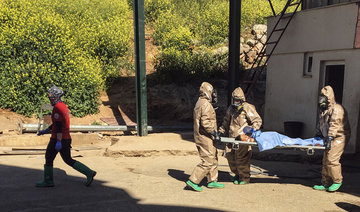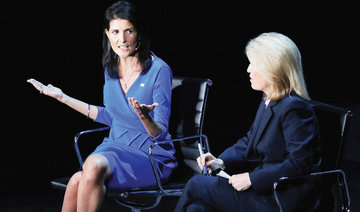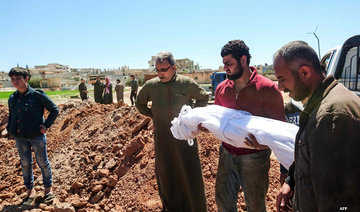WASHINGTON: US President Donald Trump told members of Congress he is “considering military action in Syria,” after a suspected chemical attack that killed at least 83 people.
Trump’s assertion, reported by CNN, came a day after he accused the Syrian regime of gassing its people and pledged that “these heinous actions cannot be tolerated.”
Speaking to reporters aboard Air Force One on Thursday, Trump said that what happened in Syria is “a disgrace to humanity” and “what Assad did is terrible.”
Asked if Assad should go, Trump said: “He’s there, and I guess he’s running things so something should happen.” He said the attack “shouldn’t have happened, and it shouldn’t be allowed to happen.”
While no decision has been made yet, a defense analyst told Arab News that military options could include “US cruise missile strikes against major Syrian Air Force installations.”
Following the chemical weapons attack in Idlib on Monday, CNN reported Thursday that Trump is considering military action in Syria but “had not firmly decided to go ahead with it.”
He is “discussing possible actions with Defense Secretary James Mattis,” it was reported.
Mattis’ role appears to be central as the Pentagon has submitted to the US administration “long-standing options to strike Syria’s chemical weapons capability,” according to CNN.
French Foreign Minister Jean-Marc Ayrault said Thursday that “a day will come when international justice will give its verdict on (Syrian President) Bashar Assad who is massacring his people.”
Speaking to news channel CNEWS, he added: “These crimes must not go unpunished. In any case, there are investigations, United Nations commissions... there will be a war crimes trial.
“It’s difficult because up to now every time we have presented a resolution, there has been a veto by Russia and sometimes by China ... but we must cooperate because we need to stop this massacre.”
German Chancellor Angela Merkel said it was a scandal that the UN Security Council did not pass a resolution condemning the suspected chemical attack in Syria this week.
“It was a barbaric attack that must be cleared up. The use of chemical weapons is a war crime,” Merkel told a news conference in eastern Germany, adding there were some indications it was carried out by Assad’s forces.
“It is a scandal that no UN Security Council resolution materialized and those who opposed it must consider what responsibility they bear,” she said.
Tobias Schneider, a defense analyst based in Berlin and a close watcher of the Syrian conflict, told Arab News that “as of now, there appears to be no coherent position coming from the White House.”
He added: “If Trump is indeed willing to push aside institutional skepticism about intervention against Assad, he will be looking for military options that are both sufficiently symbolic and punitive.”
Such options could include, according to Schneider, “cruise missile strikes against major Syrian Air Force installations,” but could “obviously risk ... accidentally hitting Russian troops.”
Schneider also cautioned that “after the dust settles, Assad could repair the damaged runways and claim for himself to have survived an onslaught by the mightiest military in the world, hence taunting the US to either lose face or escalate further — a dangerous prospect with a President Trump.”
Also on Thursday, President Vladimir Putin’s spokesman said Russia’s support for Assad is not unconditional, but that the country demands a full investigation of the suspected chemical attack on an opposition-held province in Syria before the UN takes any action.
Dmitry Peskov told The Associated Press that “unconditional support is not possible in this current world,” but added that “it is not correct to say that Moscow can convince Mr. Assad to do whatever is wanted in Moscow. This is totally wrong.”
France warned Russia it would face a “terrible responsibility in front of history” if it decides to veto a draft UN resolution demanding an investigation of the suspected chemical attack in Syria.
Negotiations were continuing on the proposed measure presented by France, Britain and the US, but chances for a compromise with Russia appeared dim.
tions in good faith to adopt a resolution,” French Ambassador Francois Delattre told reporters in New York. “But make no mistake about it: We need a robust text,” he said.
Asked about the threat of a Russian veto of the measure, Delattre indicated that Russia would be harshly judged by history. “That would be a terrible responsibility in front of history,” he said.
British Foreign Minister Boris Johnson said he cannot understand how anyone on the UN Security Council could fail to sign up to a resolution condemning the attack.
Johnson said on Thursday during a visit to Sarajevo that he “cannot understand how anybody on the UN Security Council could fail to sign up to a motion condemning the actions of the (Assad) regime that is almost certainly responsible for that crime.”
Johnson described the attack in Idlib as “abominable and contemptible” and said “those who did it deserve international condemnation.”
In Turkey, President Recep Tayyip Erdogan has said he hopes Trump will take military action in Syria after this week’s attack.
Turkey’s state-run Anadolu Agency quoted Erdogan as reacting to news reports Thursday that Trump was mulling military action after the assault in the northern Syrian town of Khan Sheikhun.
It quoted Erdogan as saying Turkey would be prepared to do “whatever falls on us” to support possible military action. Turkey is a leading supporter of the opposition fighting to overthrow Assad.
Earlier, Turkish officials said that autopsies of the victims from the assault, which happened 60 miles (95 kilometers) from the Turkish border, show they were subjected to chemical weapons.
Meanwhile, two US military officials told NBC News that Syrian fixed-wing aircraft dropped suspected chemical weapons on civilians in Idlib earlier this week in a deadly attack which killed at least 83 people — including 25 children — and injured at least 350 others.
The US military saw the aircraft on a radar and watched them drop the bombs, the officials said. The radar soon picked up the flashes and booms in the opposition-held area of Syria.
The bombs hit a hospital run by the Al-Qaeda-linked Al-Nusra Front damaging operating rooms and injuring medical professionals, the officials said.
Soon after, civilians on the ground began responding in a way that is consistent with exposure to a nerve agent documented in horrific images of people writhing in pain, coughing and young children gasping for air.
One official said he believes there was a combination of two agents and while he does not believe one was chlorine, he would not say what they were.


“What Assad did is terrible,” says Trump as he mulls Syrian military intervention
“What Assad did is terrible,” says Trump as he mulls Syrian military intervention

Security officer arrested over Syria killings: official

DAMASCUS: Syria’s authorities have arrested an internal security officer as a suspect in the killing of four civilians in the majority-Druze Sweida province, the local internal security chief said.
Four people were shot dead and a fifth seriously wounded in the incident on Saturday, in the village of Al-Matana, said Hossam Al-Tahan, the state news agency SANA reported.
The initial investigation, carried out with the help of one of the survivors of the attack, indicated that one suspect was a member of the local Internal Security Directorate, he said.
“The officer was immediately detained and referred for investigation,” he added.
The Syrian Observatory for Human Rights had earlier reported that four people were killed and a fifth wounded by gunfire from unknown assailants as they were harvesting olives.
The authorities had cleared the olive pickers to be in the northern part of the province controlled by government forces, it added.
Sweida province is the stronghold of the Druze minority in the south of the country.
Violence erupted there briefly in July last year, with clashes between Druze fighters and Sunni Bedouin that rapidly escalated, drawing in government forces and tribal fighters from other parts of Syria.
Syrian authorities have said their forces intervened to stop the clashes, but witnesses, Druze factions and the London-based Observatory have accused them of siding with the Bedouin and committing abuses against the Druze.
Although a ceasefire was reached later that month, the situation remained tense and access to Sweida difficult.
Residents accuse the government of having imposed a blockade on the province, from which tens of thousands of inhabitants have fled — a charge Damascus denies.
Several aid convoys have entered since then.
According to the Syrian Observatory for Human Rights, more than 185,000 people remain uprooted.
Four people were shot dead and a fifth seriously wounded in the incident on Saturday, in the village of Al-Matana, said Hossam Al-Tahan, the state news agency SANA reported.
The initial investigation, carried out with the help of one of the survivors of the attack, indicated that one suspect was a member of the local Internal Security Directorate, he said.
“The officer was immediately detained and referred for investigation,” he added.
The Syrian Observatory for Human Rights had earlier reported that four people were killed and a fifth wounded by gunfire from unknown assailants as they were harvesting olives.
The authorities had cleared the olive pickers to be in the northern part of the province controlled by government forces, it added.
Sweida province is the stronghold of the Druze minority in the south of the country.
Violence erupted there briefly in July last year, with clashes between Druze fighters and Sunni Bedouin that rapidly escalated, drawing in government forces and tribal fighters from other parts of Syria.
Syrian authorities have said their forces intervened to stop the clashes, but witnesses, Druze factions and the London-based Observatory have accused them of siding with the Bedouin and committing abuses against the Druze.
Although a ceasefire was reached later that month, the situation remained tense and access to Sweida difficult.
Residents accuse the government of having imposed a blockade on the province, from which tens of thousands of inhabitants have fled — a charge Damascus denies.
Several aid convoys have entered since then.
According to the Syrian Observatory for Human Rights, more than 185,000 people remain uprooted.
© 2026 SAUDI RESEARCH & PUBLISHING COMPANY, All Rights Reserved And subject to Terms of Use Agreement.












